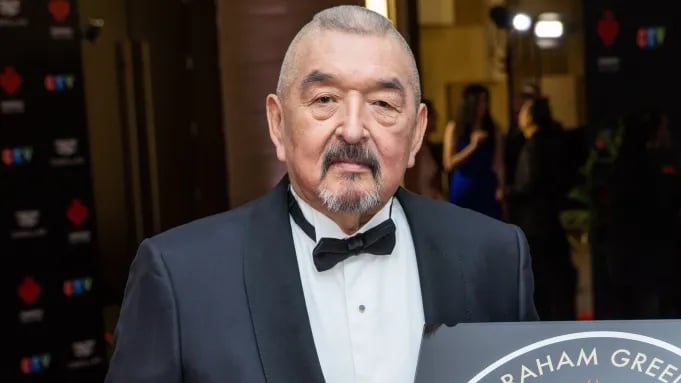Remembering Graham Greene: A Pioneer's Legacy on Screen and Stage
The celebrated Canadian actor Graham Greene, an Oscar-nominated star and trailblazer for Indigenous representation, has died at age 73.
NEWS
Muhammad Atique
9/2/20253 min read


His death was confirmed by his Canadian agent, Gerry Jordan, bringing to a close a prolific five-decade career that saw him transition from a working-class background in Ontario to an Academy Award-nominated Hollywood star.
Greene, a member of the Oneida First Nation, will be forever remembered for his powerful and nuanced portrayals of Indigenous characters. While he achieved global fame for his work in major motion pictures, he remained deeply committed to Canadian film, television, and theater throughout his life, becoming a national icon for his achievements. His legacy is not just defined by the roles he played, but by the doors he opened for generations of Indigenous artists who followed in his footsteps.
A Storied Career: From Breakthrough to Blockbuster
As Kicking Bird, a gentle Lakota medicine man, Greene delivered a performance of quiet dignity and strength that resonated with audiences worldwide. The role earned him an Academy Award nomination for Best Supporting Actor, and while he did not win, his presence at the 1991 Oscars—where the film took home seven The film's multiple awards, including its win for Best Picture, cemented Graham Greene's reputation as a major talent on the international stage. Following this breakthrough, Greene became a familiar face in several Hollywood blockbusters.
One of his most memorable performances came in the 1999 Oscar-nominated film The Green Mile, where he portrayed Arlen Bitterbuck, a thoughtful Native American inmate awaiting execution. In later years, he appeared in films such as The Twilight Saga: New Moon (2009) and the 2017 neo-Western Wind River, continuing to work steadily in major productions.
While he was known for his roles on the big screen, Greene maintained a prolific and significant presence in television as well. He was a top-billed star in the 1992 television movie The Last of His Tribe, playing the last known survivor of the Yahi tribe. He also appeared in classic series like The Outer Limits, and later became a beloved recurring character in a number of television dramas, including his role as casino security chief Malachi Strand in Lou Diamond Phillips's show, Longmire. He played the wealthy mine owner Rafe McCawley in the sci-fi series Defiance and was also a key cast member in the short-lived supernatural drama Wolf Lake. In his final years, Greene's face remained instantly recognizable to new audiences through guest appearances in critically acclaimed contemporary series such as Reservation Dogs and The Last of Us.
His career began long before his Hollywood fame. Greene’s first television role was in a 1979 Canadian series, The Great Detective, and he made his film debut in the 1983 biopic Running Brave. In a testament to his tireless work ethic, Greene’s final two films, Ice Fall and Afterwards, are scheduled for release later this year.
A Proud Canadian Artist
Graham Greene's professional journey began far from the glamour of Hollywood. Born on June 22, 1952, on the Oneida Reserve in southwestern Ontario, he was a member of the Oneida First Nation, part of the Six Nations Reserve. Before discovering his passion for acting, he worked a variety of blue-collar jobs, including as a draftsman, welder, civil technician, and steelworker. He even worked as an audio engineer for rock bands, a testament to his varied early career. A 1974 graduate of the Center for Indigenous Theater in Toronto, he received his formal training there.
Despite the international acclaim he achieved, Greene remained a proud Canadian who was resolute in his refusal to move to Los Angeles or New York to pursue his career. In a 2025 interview, upon receiving the Governor General’s Award for lifetime artistic achievement, he stated, "I don’t like any of those places. I was born in Canada, and I’m here to stay, and that’s it." This steadfast commitment to his home country and its artistic community earned him a number of prestigious national honors. In recognition of his achievements in film and theater, he was honored with two of the country's most prestigious distinctions: induction into the Order of Canada in 2016.
Greene was a lifelong advocate for the discipline of theater, which he credited with giving him the skills to build a character and grounding him as an actor. He regularly performed at Canadian venues, including the Stratford Festival and with Native Earth Performing Arts, an Indigenous theater company, ensuring he stayed connected to his roots. In a 2012 interview, he revealed that his marriage to his wife, Hilary Blackmore, was "the best time of my life." He resided with her outside of Toronto until his peaceful passing.
A Lasting Legacy for Indigenous Storytelling
When he began his career, opportunities for Indigenous actors and storytellers were scarce. He was one of the first to break through, and his success helped pave the way for a new generation of Indigenous talent. In a quote to the Governor General’s Awards, he reflected on the difficult path he had to take. "At first there was nothing, no real outlet for our acting, our storytelling, our careers, our talent," he said.
